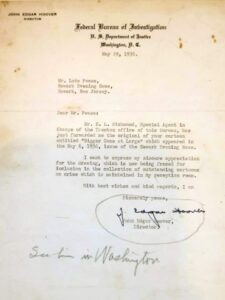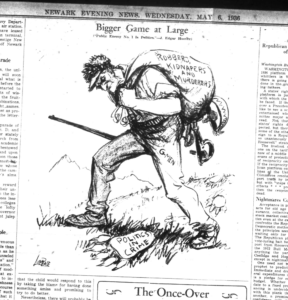 Last month I filled out the census form sent by the US government. Mandated by the Constitution and used to determine things like the number of Congressional members for each state and the division of federal funds, it’s important to get as many people counted as possible. (In fact, based on the 2000 census, my home state of Colorado qualified for an extra House member, bringing our total up to nine.)
Last month I filled out the census form sent by the US government. Mandated by the Constitution and used to determine things like the number of Congressional members for each state and the division of federal funds, it’s important to get as many people counted as possible. (In fact, based on the 2000 census, my home state of Colorado qualified for an extra House member, bringing our total up to nine.)
But some people refused to fill out the form, citing privacy concerns. The requested information was minimal, but it still goes beyond the “Enumeration” required by the Constitution, asking for such things as your name and ethnicity. When responding to privacy issues, census officials always refer to the laws prohibiting release of census data until 70 years have passed. But these officials seem to forget it’s the government that made those laws, and the government can always change them should the need arise. The Constitution has no provisions for the privacy of census data.
In fact, something along these lines occurred in 1941. Four days after the Pearl Harbor attack, the government used Census data to help round up Americans of Japanese descent, who were placed in internment camps. More recently, the Census Bureau compiled reports of Americans of Arab descent for use by Homeland Security. (They gave population by city and ZIP code.)
So the net result is that census privacy can be broken, given sufficient cause. Does this mean you shouldn’t fill out the form? You’ll have to determine the answer for that one yourself.
Link: http://yro.slashdot.org/…


 Net neutrality has been a hot topic in the internet world, but many people have no idea why it’s important. The linked article gives the best definition that I’ve seen. Essentially, without net neutrality, your ISP and other network providers can play god in regards to the content you receive. They can block certain sites or give preferential treatment to sites. They can demand that a content provider (e.g., Google) pay them in order to not have their content receive degraded performance. This is not hypothetical—I remember reading about how the CEO of a major network provider wanted to charge companies like Google for the traffic coming over its system, even though the network provider’s subscribers were already paying for that access. He saw it as a source of additional income and was upset that Google didn’t have to pay to use the company’s network.
Net neutrality has been a hot topic in the internet world, but many people have no idea why it’s important. The linked article gives the best definition that I’ve seen. Essentially, without net neutrality, your ISP and other network providers can play god in regards to the content you receive. They can block certain sites or give preferential treatment to sites. They can demand that a content provider (e.g., Google) pay them in order to not have their content receive degraded performance. This is not hypothetical—I remember reading about how the CEO of a major network provider wanted to charge companies like Google for the traffic coming over its system, even though the network provider’s subscribers were already paying for that access. He saw it as a source of additional income and was upset that Google didn’t have to pay to use the company’s network. So you’re an eBay seller and have received negative feedback from a customer. You do what you can to resolve the problem, but the buyer refuses to remove the feedback. What can you do? Well, if you’re in the United States then you file a lawsuit. The seller, Med Express, is suing the the buyer, Amy Nicholls, for slander.
So you’re an eBay seller and have received negative feedback from a customer. You do what you can to resolve the problem, but the buyer refuses to remove the feedback. What can you do? Well, if you’re in the United States then you file a lawsuit. The seller, Med Express, is suing the the buyer, Amy Nicholls, for slander. The US government has come out with a new design for the $100 bill, one that incorporates even more security features. There’s a blue strip woven into the bill with bells that turn into “100”s as you move the bill one direction, and moving bells/100s as you shift the bill in another direction. The bill also has an inkwell with a bell inside that changes color as you move the bill, such that it seems to appear and disappear. Really fancy stuff.
The US government has come out with a new design for the $100 bill, one that incorporates even more security features. There’s a blue strip woven into the bill with bells that turn into “100”s as you move the bill one direction, and moving bells/100s as you shift the bill in another direction. The bill also has an inkwell with a bell inside that changes color as you move the bill, such that it seems to appear and disappear. Really fancy stuff. With the election coming up on Tuesday, the linked article discusses the changes made in the wake of the problems with the 2000 presidential election. To summarize: computerized voting machines are actually worse than the paper ballots that failed so dramatically in 2000.
With the election coming up on Tuesday, the linked article discusses the changes made in the wake of the problems with the 2000 presidential election. To summarize: computerized voting machines are actually worse than the paper ballots that failed so dramatically in 2000. Cigarette taxes are typically justified by earmarking them to cover the increased health care costs for smokers, but I think they’re really imposed in an effort to make the cost so high that smokers will quit. In New York City smokers pay an insanely high cigarette tax rate, $6.46 per pack, yet a recent study shows “no decline in smoking among low-income smokers, despite tax increases since 2003”.
Cigarette taxes are typically justified by earmarking them to cover the increased health care costs for smokers, but I think they’re really imposed in an effort to make the cost so high that smokers will quit. In New York City smokers pay an insanely high cigarette tax rate, $6.46 per pack, yet a recent study shows “no decline in smoking among low-income smokers, despite tax increases since 2003”. The US Navy is attempting to develop a superlaser for use on its ships, and the latest prototype can burn through 20 feet of steel per second at 14 kilowatts. The power level needs to reach 100 kilowatts to be useful in the field, and the Navy’s ultimate goal is to reach a megawatt and be able to pierce 2000 feet of steel per second. Expect this technology to be deployed sometime in the next 10-20 years.
The US Navy is attempting to develop a superlaser for use on its ships, and the latest prototype can burn through 20 feet of steel per second at 14 kilowatts. The power level needs to reach 100 kilowatts to be useful in the field, and the Navy’s ultimate goal is to reach a megawatt and be able to pierce 2000 feet of steel per second. Expect this technology to be deployed sometime in the next 10-20 years.